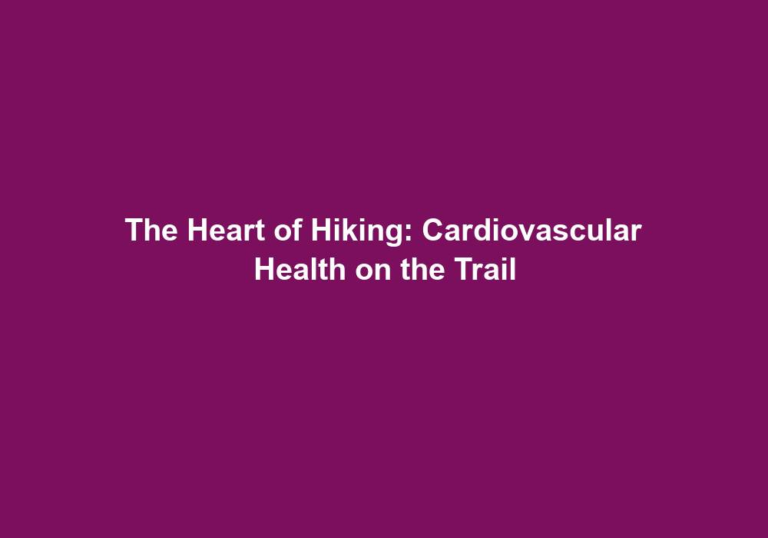Decoding Cholesterol: What Your Levels Reveal about Heart Health
Cholesterol is a complex topic that often confuses individuals when it comes to understanding its impact on heart health. In this article, we will delve into the world of cholesterol and decode what your levels reveal about your heart health. By the end, you will have a clearer understanding of cholesterol and its implications.
What is Cholesterol?
Cholesterol is a waxy, fat-like substance that is naturally produced by the liver and also obtained through certain foods. It plays a vital role in the body, helping to build cell membranes, produce hormones, and aid in digestion. However, too much cholesterol can lead to serious health problems, particularly heart disease.
Cholesterol is not inherently bad. In fact, it is necessary for the body to function properly. It is used to build cell membranes, which are essential for the structure and integrity of every cell in the body. Cholesterol is also a precursor for the production of hormones such as estrogen and testosterone. Additionally, it helps in the digestion of fat-soluble vitamins.
Different Types of Cholesterol
There are two main types of cholesterol: LDL (low-density lipoprotein) and HDL (high-density lipoprotein).
- LDL Cholesterol: Known as bad cholesterol, LDL cholesterol can build up in the arteries, forming plaques that can restrict blood flow and increase the risk of heart disease and stroke.
LDL cholesterol is often referred to as “bad” cholesterol because high levels of it can contribute to the development of atherosclerosis, a condition characterized by the buildup of plaques in the arteries. These plaques can narrow the arteries and restrict blood flow, potentially leading to heart attacks and strokes.
- HDL Cholesterol: Often referred to as good cholesterol, HDL cholesterol helps remove LDL cholesterol from the arteries and transports it back to the liver, where it can be processed and eliminated from the body.
HDL cholesterol, on the other hand, is often called “good” cholesterol because it helps remove LDL cholesterol from the arteries and transports it back to the liver for processing and elimination. Higher levels of HDL cholesterol are generally associated with a lower risk of heart disease.
Understanding Cholesterol Levels
When you get your cholesterol levels tested, the results will typically include the following measurements:
- Total Cholesterol: This encompasses both LDL and HDL cholesterol levels combined.
Total cholesterol is the sum of LDL cholesterol, HDL cholesterol, and a fraction of triglycerides. It provides an overall picture of your cholesterol levels and is an important factor in assessing your heart health.
- LDL Cholesterol: The lower the LDL cholesterol levels, the better it is for your heart health.
Lower LDL cholesterol levels are generally associated with a lower risk of heart disease. It is important to keep LDL cholesterol levels within the recommended range to minimize the risk of developing cardiovascular problems.
- HDL Cholesterol: Higher levels of HDL cholesterol are generally considered beneficial for heart health.
Higher levels of HDL cholesterol are desirable as it helps remove LDL cholesterol from the arteries, reducing the risk of plaque formation and maintaining good heart health.
- Triglycerides: Triglycerides are another type of fat found in the blood. Elevated levels of triglycerides can also contribute to heart disease.
Triglycerides are a type of fat that the body stores for energy. High triglyceride levels are associated with an increased risk of heart disease. It is important to keep triglyceride levels within the recommended range to maintain a healthy heart.
Interpreting Cholesterol Levels
To help decode your cholesterol levels, it is important to understand the recommended ranges:
- Total Cholesterol: An optimal total cholesterol level is below 200 milligrams per deciliter (mg/dL). Higher levels may indicate a higher risk of heart disease.
Keeping total cholesterol levels below 200 mg/dL is considered optimal for heart health. Higher levels may indicate an increased risk of developing heart disease.
- LDL Cholesterol: Ideally, LDL cholesterol levels should be below 100 mg/dL. If you have existing heart disease or other risk factors, your doctor may recommend an even lower target level.
Maintaining LDL cholesterol levels below 100 mg/dL is recommended for good heart health. Individuals with existing heart disease or other risk factors may need to achieve even lower levels to reduce the risk of complications.
- HDL Cholesterol: For HDL cholesterol, higher levels are more desirable. A level above 60 mg/dL is considered protective against heart disease, while levels below 40 mg/dL for men and 50 mg/dL for women may increase the risk.
Having higher levels of HDL cholesterol is beneficial for heart health. An HDL cholesterol level above 60 mg/dL is considered protective against heart disease, while levels below 40 mg/dL for men and 50 mg/dL for women may increase the risk.
- Triglycerides: Normal triglyceride levels are below 150 mg/dL. Higher levels may be associated with an increased risk of heart disease.
Maintaining triglyceride levels below 150 mg/dL is considered normal. Higher levels may indicate an increased risk of heart disease.
Factors Influencing Cholesterol Levels
Several factors can influence your cholesterol levels, including:
- Diet: A diet high in saturated and trans fats can raise LDL cholesterol levels. On the other hand, consuming foods rich in omega-3 fatty acids, such as fatty fish, can help increase HDL cholesterol levels.
A diet high in saturated and trans fats can contribute to elevated LDL cholesterol levels. It is important to limit the consumption of foods such as red meat, full-fat dairy products, and processed snacks. On the other hand, including foods rich in omega-3 fatty acids, such as fatty fish, can help increase HDL cholesterol levels. Incorporating sources of healthy fats, such as avocados, nuts, and olive oil, can also have a positive impact on cholesterol levels.
- Physical Activity: Regular exercise can help raise HDL cholesterol levels and lower LDL cholesterol levels.
Engaging in regular physical activity can have a positive effect on cholesterol levels. Exercise helps raise HDL cholesterol levels, which aids in the removal of LDL cholesterol from the arteries. Additionally, it can help lower LDL cholesterol levels, reducing the risk of plaque formation.
- Weight: Being overweight or obese can contribute to higher LDL cholesterol and triglyceride levels and lower HDL cholesterol levels.
Maintaining a healthy weight is important for managing cholesterol levels. Being overweight or obese can contribute to higher LDL cholesterol and triglyceride levels, while lowering HDL cholesterol levels. Losing weight through a combination of healthy eating and regular exercise can significantly improve cholesterol levels.
- Age and Gender: As we age, cholesterol levels tend to rise. Before menopause, women often have higher HDL cholesterol levels than men, but after menopause, the levels tend to equalize.
Cholesterol levels tend to rise with age, making it important to monitor and manage cholesterol levels as we get older. Before menopause, women typically have higher levels of HDL cholesterol compared to men. However, after menopause, the levels tend to equalize.
- Genetics: Some individuals may have a genetic predisposition for higher cholesterol levels. This is known as familial hypercholesterolemia and requires medical management.
Genetics can play a significant role in cholesterol levels. Some individuals may have a genetic predisposition for higher cholesterol levels, known as familial hypercholesterolemia. This condition requires medical management, including the use of medications, to control cholesterol levels effectively.
Managing Cholesterol Levels
If your cholesterol levels are outside the optimal range, there are several lifestyle changes and medical interventions that can help manage and improve your heart health:
- Healthy Diet: Adopt a heart-healthy diet that includes fruits, vegetables, whole grains, lean proteins, and healthy fats. Limit saturated and trans fats, as well as cholesterol-rich foods.
A heart-healthy diet is essential for managing cholesterol levels. It should include a variety of fruits, vegetables, whole grains, lean proteins, and healthy fats. Limiting the consumption of saturated and trans fats is crucial for maintaining healthy cholesterol levels. Additionally, reducing the intake of cholesterol-rich foods such as organ meats and shellfish can also be beneficial.
- Regular Exercise: Engage in moderate-intensity aerobic exercise for at least 150 minutes per week, or vigorous-intensity exercise for 75 minutes per week, along with strength training exercises twice a week.
Regular exercise is an important component of managing cholesterol levels. Engaging in moderate-intensity aerobic exercise, such as brisk walking or cycling, for at least 150 minutes per week can help raise HDL cholesterol levels and lower LDL cholesterol levels. Additionally, incorporating strength training exercises twice a week can further improve heart health.
- Weight Management: If you are overweight or obese, losing weight through a combination of healthy eating and physical activity can significantly improve your cholesterol levels.
Maintaining a healthy weight is crucial for managing cholesterol levels. If you are overweight or obese, losing weight through a combination of a healthy diet and regular physical activity can have a positive impact on cholesterol levels. It is important to consult with a healthcare professional or registered dietitian for personalized guidance and support.
- Medication: In some cases, lifestyle changes may not be sufficient to manage cholesterol levels. Your doctor may prescribe medications, such as statins, to help lower LDL cholesterol levels.
In certain situations, lifestyle changes alone may not be enough to effectively manage cholesterol levels. If lifestyle modifications do not lead to significant improvements, your healthcare provider may recommend medications, such as statins. These medications work by reducing the production of cholesterol in the liver, thereby lowering LDL cholesterol levels. It is important to follow your doctor’s advice and take medication as prescribed.
Conclusion
Understanding your cholesterol levels is crucial for assessing your heart health. By decoding the different types of cholesterol, interpreting cholesterol level measurements, and being aware of the factors that influence cholesterol levels, you can take proactive steps to manage and improve your heart health. Remember, a healthy lifestyle, including a balanced diet, regular exercise, weight management, and, if necessary, medication, can go a long way in keeping your cholesterol levels in check and reducing the risk of heart disease.







